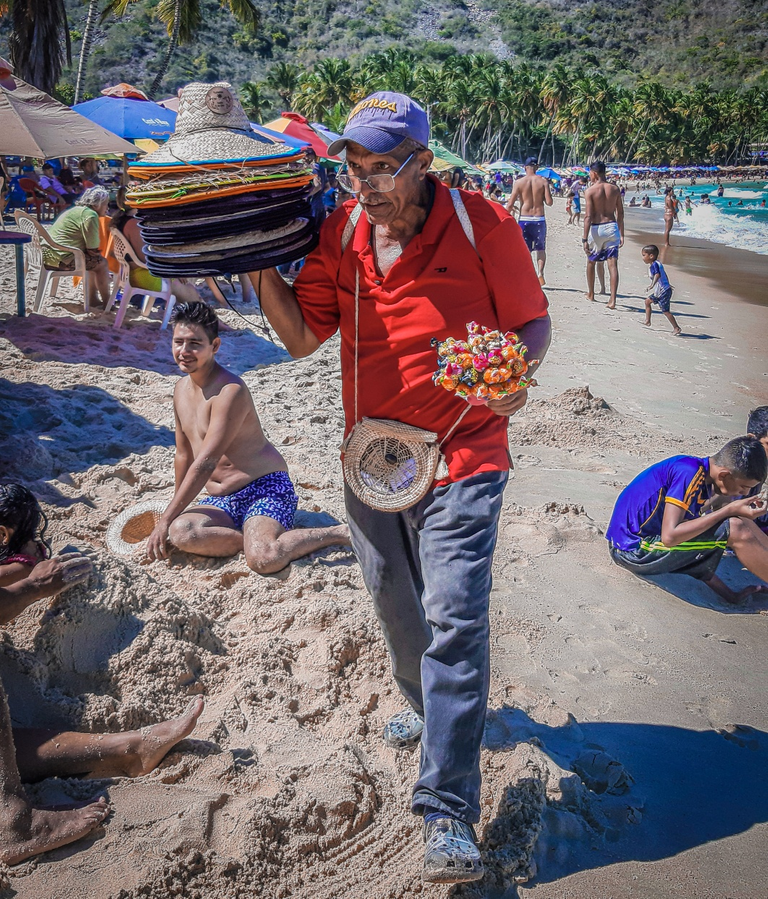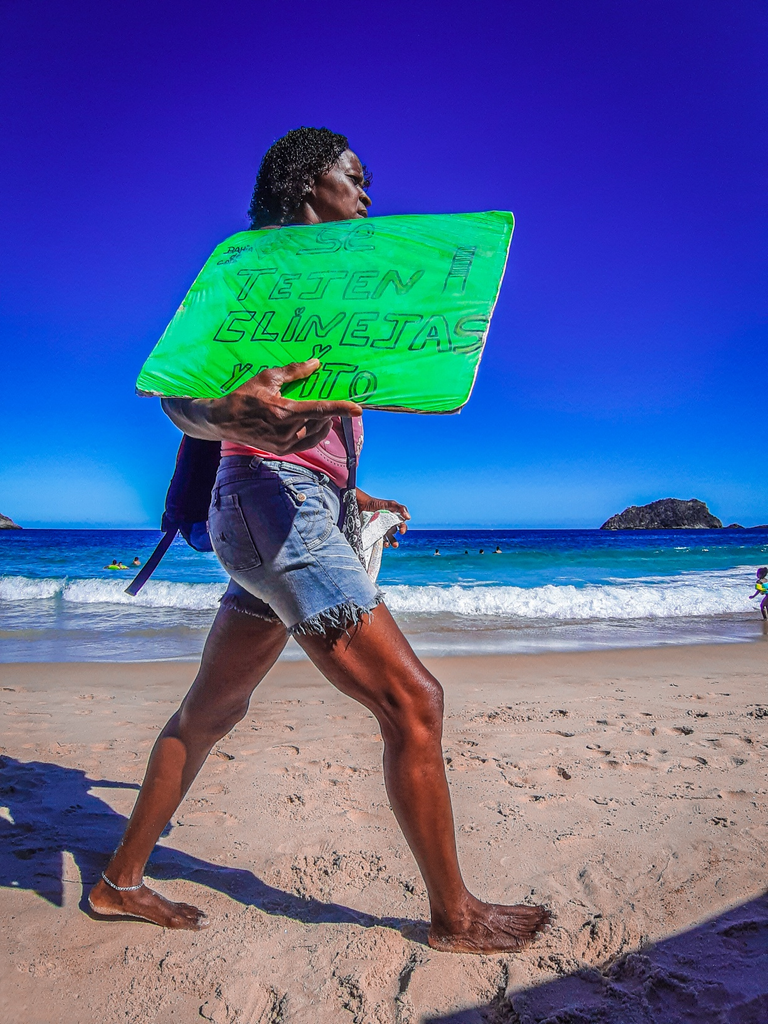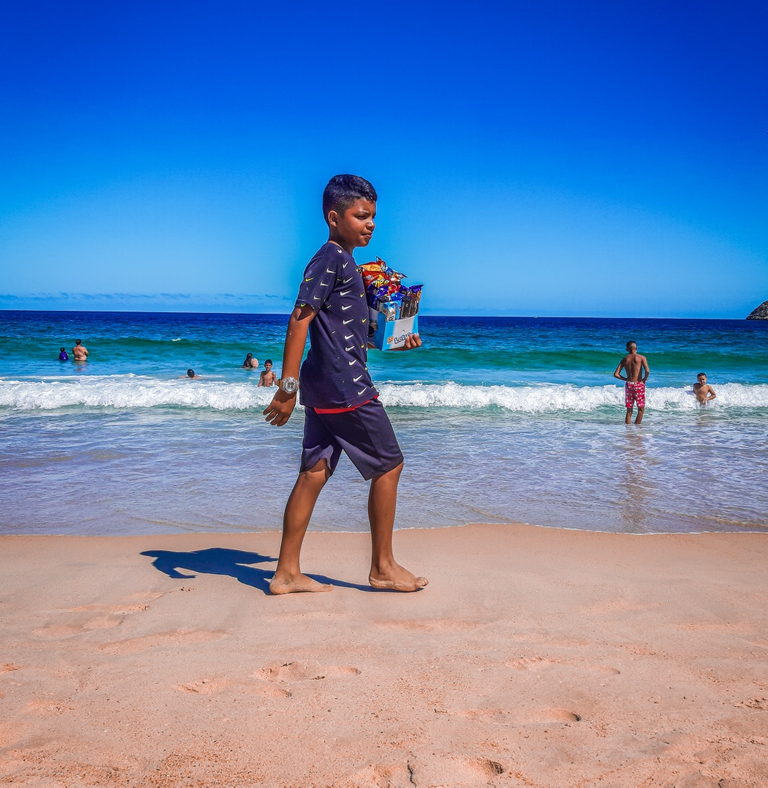
Hace unas semanas un conocido publicó en su FB las siguientes fotos, tomadas en la hermosa Bahia de Cata, una famosa playa de las costas del estado Aragua (Venezuela). En ellas se muestra un poco de la vida de los comerciantes de la zona, que aprovechan las temporadas altas (en las cuales van muchos turistas y visitantes) para obtener sus ingresos para vivir.
Me quedé reflexionando sobre la difícil situación que pasamos todos durante la cuarentena, pero sobre todo este tipo de personas que necesitan de la afluencia externa para ganarse el sustento. En esa época las playas quedaron vacías e incluso para esas zonas había puntos de control en la vía y no dejaban pasar a quienes no tuvieran una constancia de residencia, para evitar que se propagara el virus.
Ahora gracias a las vacunas hemos logrado tener un poco más de libertad, y pese a que el virus y sus variantes aún siguen latentes, su gravedad ha bajado, lo que ha permitido a las zonas costeras empezar a recuperar paulatinamente su esplendor.
Ver estas fotografías me inspiró a escribir este post y mostrarles a ustedes otro pedacito de mi tierra. En la primera foto podemos observar un joven llevando unos pescados, ellos trabajan con las personas que hacen comida en la playa, se encargan de ofrecer a los visitantes el pescado de su elección, para posteriormente freírlos en filetes, ruedas o entero y servirlo con los típicos tostones o arroz y ensalada.
También los pescadores de estos lugares suelen vender el pescado directamente o intercambiarlo por productos como harina de maíz, azúcar, leche en polvo, aceite comestible, entre otros.
A few weeks ago an acquaintance posted on his FB the following photos, taken in the beautiful Bahia de Cata, a famous beach on the coast of the state of Aragua (Venezuela). They show a little of the life of the merchants of the area, who take advantage of the high seasons (in which many tourists and visitors go) to get their income to live.
I was left reflecting on the difficult situation we all went through during the quarantine, but especially this type of people who need the external influx to make a living. At that time the beaches were empty and even for those areas there were checkpoints on the road and they did not allow those who did not have proof of residence to pass, to prevent the virus from spreading.
Now thanks to the vaccines we have managed to have a little more freedom, and although the virus and its variants are still latent, its severity has decreased, which has allowed the coastal areas to gradually recover their splendor.
Seeing these photographs inspired me to write this post and show you another little piece of my land. In the first picture we can see a young man carrying some fish, they work with the people who make food on the beach, they are in charge of offering visitors the fish of their choice, to later fry them in fillets, wheels or whole and serve it with the typical fried green plantains or rice and salad.
Also the fishermen of these places usually sell the fish directly or exchange it for products such as corn flour, sugar, powdered milk, edible oil, among others.

Seguidamente están los infaltables vendedores de mariscos, algunos venden solo ostras como este señor, que las lleva en unos tobos.
Next are the infallible seafood vendors, some sell only oysters like this gentleman, who carries them in a few buckets.

Otros realizan preparados de varios mariscos que son muy famosos por ser “afrodisíacos” y tienen nombres bastante jocosos como lo es “rompe colchón”, “salva matrimonios”, “7 potencias” e incluso “se acuestan 2 y amanecen 3”, los venden ya envasados con limón, picante y otros condimentos.
Others make preparations of various seafood that are very famous for being "aphrodisiacs" and have quite humorous names such as "mattress breaker", "saves marriages", "7 powers" and even "2 go to bed and 3 wake up", sold already packaged with lemon, spicy and other condiments.

También hay vendedores de distintos dulces de coco que son muy populares en las costas, donde abunda este fruto. Estos dulces vienen en distintas presentaciones y colores pero su esencia es la misma. Están las “cocadas” que son como unas galletas de coco, azucar y leche, las hacen blancas o de color rojo. También las conservas, que son más suaves y maleables, están hechas de coco y papelón (panela de jarabe de caña) y por último los besitos de coco son más como un pancito con forma de galleta, de máximo 10 cm de diámetro, estas si estan hechas con harina de trigo, huevos y otros ingredientes, parecen unas galletas pero en realidad son bastante suaves.
There are also vendors of different coconut sweets that are very popular in the coasts, where this fruit is abundant. These sweets come in different presentations and colors but their essence is the same. There are the "cocadas" which are like coconut cookies, sugar and milk, they make them white or red. There are also the "conservas", which are softer and more malleable, they are made of coconut and "papelón" (sugar cane syrup panela) and finally the "besitos de coco" are more like a small cookie-shaped bread, with a maximum diameter of 10 cm, these are made with wheat flour, eggs and other ingredients, they look like cookies but are actually quite soft.

por supuesto no pueden faltar los vendedores de helados, con su cava al hombro y su campanita, atrayendo la atención de los bañistas.
Of course you can't miss the ice cream sellers, with their little bells and their coolbox on their shoulders, attracting the attention of the bathers.

Como no todo se trata de comida, por supuesto que ofrecen otros productos y servicios
Since it's not all about food, they of course offer other products and services.

La edad no es un impedimento, aqui vemos este señor que vende lindos sombreros y chupetas

También lentes de sol
¿Cómo ir a la playa y no hacerse un yuyito? Esta es una trenza que hacen con hilo y conchitas de colores, se pueden hacer incluso con el pelo corto a diferencia de las “clinejas” que son trenzas normales con cabello y otros accesorios si le quieres agregar.
How to go to the beach and not get a yuyito? This is a braid made with yarn and colored shells, it can be done even with short hair, unlike the " braid clinejas" which are normal braids with hair and other accessories if you want to add them.

"Se tejen clinejas y yuyito"

Tatuajes temporales

Los niños también colaboran con la economía de sus hogares, aquí todos deben trabajar.
Todos estos vendedores se pasan el día caminando de un extremo a otro de la playa, pescando clientes entre la multitud, tal cual como pescadores en el mar. Unos van con crocs o sandalias, otros prefieren ir descalzos, porque ya están acostumbrados y no se queman con lo caliente de la arena.
Me alegra haberles podido mostrar estas imágenes de cómo es la vida de quienes habitan en los pueblos costeros de mi estado, de verdad ya me dan ganas de volver a ir! A finales del mes de Enero estuve allí y no pude disfrutar mucho porque la verdad me molesta el exceso de gente. Espero que les guste y para despedirme… ¿Qué tal una piña colada?
All these vendors spend the day walking from one end of the beach to the other, fishing for customers in the crowd, just like fishermen in the sea. Some wear Crocs or sandals, others prefer to go barefoot, because they are used to it and don't get burned by the hot sand.
I am glad to have been able to show you these images of what life is like for those who live in the coastal towns of my state, it really makes me want to go there again! At the end of January I was there and I couldn't enjoy it much because the excess of people bothered me. I hope you like it and to say goodbye... How about a piña colada?


Todas las fotos son cortesía de Kriminal con Sabor Photos
Gracias por leerme. | Thanks for reading.

Congratulations @fanyokami! You received a personal badge!
You can view your badges on your board and compare yourself to others in the Ranking